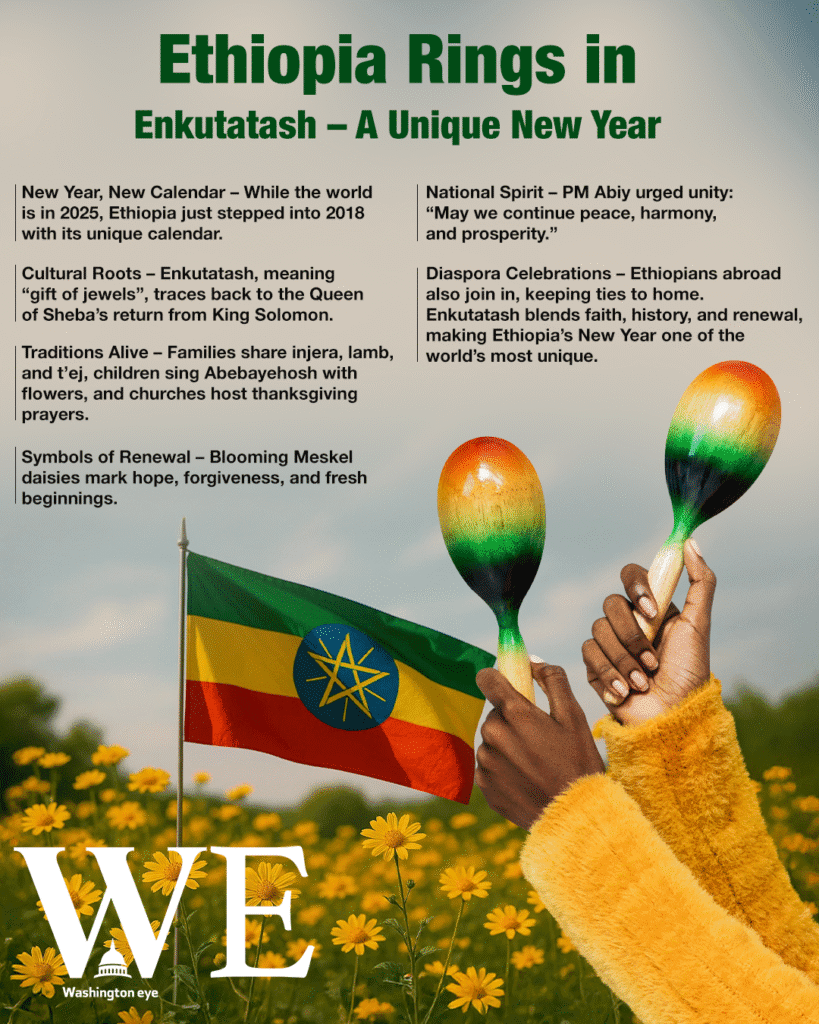While much of the world marked the dawn of 2025 nearly nine months ago, Ethiopians this week welcomed a new year of their own, 2018 as the nation celebrated Enkutatash, the Ethiopian New Year, with song, festivity, and deeply rooted cultural traditions. The celebrations, which took place across cities and villages, were filled with music, prayer, and family gatherings, marking a moment of both spiritual and seasonal renewal.
Ethiopia follows the Ethiopian calendar, a unique system derived from the ancient Alexandrian or Coptic calendar, which runs seven to eight years behind the Gregorian calendar used globally. The discrepancy comes from different calculations of the date of the Annunciation of Jesus Christ, which means that while the world counts 2025, Ethiopians are stepping into 2018. Their year begins on Mäsqäl 1, which falls on September 11 or 12 in the Gregorian system and coincides with the end of the rainy season and the arrival of spring in the Horn of Africa.
Enkutatash, meaning “gift of jewels” in Amharic, has its roots in the legendary return of the Queen of Sheba to Ethiopia after visiting King Solomon in Jerusalem about 3,000 years ago. Upon her arrival, she and her entourage were greeted with gifts of jewels, giving the holiday its name. Over the centuries, it has evolved into a cultural and religious celebration that blends historical legend with Christian tradition, taking place against the backdrop of blooming yellow Meskel daisies, which symbolize hope and rejuvenation.
Across Ethiopia, customs tied to the holiday remain vibrant. Families prepared traditional meals of injera, spicy stews, roast lamb, and honey wine known as t’ej. Churches hosted services of thanksgiving, with Addis Ababa’s Holy Trinity Cathedral among the key gathering points. Children, dressed in white cotton outfits embroidered with bright designs, went door-to-door singing the traditional “Abebayehosh” while carrying flowers, a practice that earns them small gifts of bread or coins from neighbors. In rural areas, community feasts and folk dances dominated, while urban centers held concerts, fireworks, and cultural performances.
Leaders and citizens alike emphasized the symbolic meaning of the new year. Prime Minister Abiy Ahmed, in a televised address, urged Ethiopians to see Enkutatash as a moment of unity and resilience. “As we step into 2018 together, may we continue to foster peace, harmony, and shared prosperity,” he said. Ordinary Ethiopians echoed similar sentiments. “The new year is always special for us,” said Mulugeta Tesfaye, a shopkeeper in Bahir Dar. “It’s a time to forgive, to start fresh, and to enjoy life with family.” Beyond Ethiopia’s borders, diaspora communities in cities such as Washington D.C., London, and Toronto also hosted New Year gatherings, filled with traditional food, music, and dance, reaffirming ties to home.
What sets Enkutatash apart from other new year celebrations around the world is its spiritual and seasonal significance. Whereas many cultures usher in the new year with fireworks and countdowns, Ethiopians emphasize faith, renewal, and agriculture. The day also signals a shift in the agricultural cycle, as rains give way to months of sunshine and farming. The Ethiopian calendar itself is distinctive, with 12 months of 30 days each plus a thirteenth month of five or six days, depending on whether it is a leap year. This system preserves a cultural identity that continues to stand apart in a rapidly globalizing world.
For many Ethiopians, Enkutatash is more than a festive holiday; it is a symbolic reset. Families clean and decorate their homes, purchase new clothes, and mend broken relationships. Farmers see it as the true beginning of the agricultural year, while merchants and city dwellers view it as an economic boost, as markets and transport services swell with activity. The holiday, deeply woven into Ethiopia’s social fabric, reflects a blend of history, faith, and community resilience.
Though Ethiopia’s calendar may diverge from the rest of the world, its message of hope, renewal, and togetherness speaks universally. As Ethiopians ring in 2018, their unique traditions remind the world that there are many ways to measure time, but the essence of new year celebrations everywhere remains the same: the joy of starting anew.


















